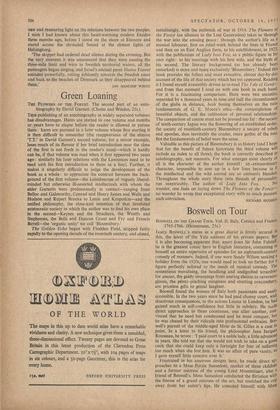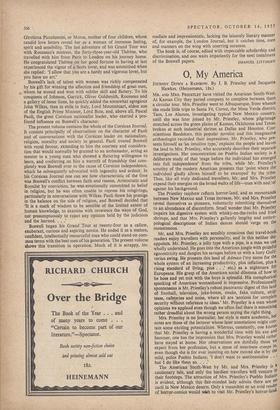Boswell on Tour
BOSWELL ON THE GRAND TOUR. Vol. II. Italy, Corsica and France. 1765-1766. (Heinemann, 25s.) JAMES BOSWELL'S status as a great diarist is firmly secured in this, the latest of the Yale editions of his private papers. Bo! it is also becoming apparent that, apart from Sir John Falstag. i he is the greatest comic hero in English literature, containing n himself an entire repertoire of episodes for an eighteenth-century comedy of manners. Indeed, if one were Sandy Wilson seeking a holiday from the 1920s, one would need to look no farther for a figure perfectly tailored to the needs of musical comedy. The sententious moralising, the headlong and undignified scrambles for amour, the giddy swoopings from soaring elation to cavernous gloom, the p&my-pinching minginess and strutting coxcomberY, are priceless gifts to genial laughter.
Boswell found the women of Italy both passionate and easily accessible. In the two years since he had paid clumsy court, with disastrous consequences, to the actress Louisa in London, he had gained much in self-confidence but little in subtlety. He made direct approaches to three countesses, one after another, cog' vinced that he need but condescend and he must conquer, but he was chased by their ridicule into professional embraces. Bos- well's pursuit of the middle-aged Mme de St. Gilles is a case in point. In a letter to his friend, the philosopher Jean Jacques Rousseau, he wrote : 'I paid court to a noble lady, a little advanced in years. She told me that she would not wish to take on a good cook that she could keep only a 'fortnight for fear of suffering too much when she lost him. It was an affair of pure vanity, s0 I gave myself little concern over it.'
Frustrated in his amorous designs here, he made direct ar proaches to a Mme Porzia Sansedoni, mother of three children and a former mistress of the young Lord Mountstuart, also a friend of Boswell's. Mme Sansedoni conducted the flirtation with the finesse of a grand mistress of the art, but snatched the cup away from her suitor's lips. He consoled himself with Mme
Girolama Piccolomini, or Moma, mother of four children, whose candid love letters reveal her as a woman of immense feeling, spirit and sensibility. The last adventure of his Grand Tour was with Rousseau's mistress, the forty-three-year-old Therese, who travelled with him from Paris to London on his journey home. He congratulated Therese on her good fortune in having at last experienced the vigour of a Scots lover, and was astonished when she replied: 'I allow that you are a hardy and vigorous lover, but you have no art.'
Boswell's lack of talent with women was richly compensated by his gift for winning the affection and friendship of great men, whom he wooed and won with subtler skill and flattery. To his conquests of Johnson, Garrick, Oliver Goldsmith, Rousseau and a gallery of lesser lions, he quickly added the somewhat egregious John Wilkes, then in exile in Italy, Lord Mountstuart, eldest son of the English Prime Minister, Lord Bute, and, above all, Pascal Paoli, the great Corsican nationalist leader, who exerted a pro- found influence on Boswell's character.
The present volume contains the whole of the Corsican Journal. It consists principally of observations on the character of Paoli and of conversations with the Corsican leader on nationalism, religion, morality and society in general. Paoli treated Boswell with royal favour, extending to him the courtesy and considera- tion that would normally be granted to an ambassador, acting as mentor to a young man who showed a flattering willingness to learn, and conferring on him a warmth of friendship that com- pletely won Boswell over to the cause of Corsican independence, which he subsequently advocated with ingenuity and ardour. In his Corsican Journal one can see how characteristic of the time was Boswell's conflict between faith and reason. Aristocratic and Royalist by conviction, he was emotionally committed to belief in religion, but he was often unable to repress his misgivings, particularly in conversations with Wilkes. Paoli threw his prestige in the balance on the side of religion, and Boswell decided that 'It is a mark of wisdom to be sensible of the limited extent of human knowledge, to examine with reverence the ways of God, nor presumptuously to reject any opinion held by the judicious and the learned. . .
Boswell began his Grand Tour at twenty-four as a callow, exuberant, curious and aspiring novice. He ended it as a mature, confident, intellectually resourceful man who could stand on com- mon terms with the best men of his generation. The present volume shows this transition in operation. Much of it is scrappy, im- mediate and impressionistic, lacking the leisurely literary manner of, for example, the London Journal, but it catches • time, men and manners on the wing with unerring sureness. The book is, of course, edited with impeccable scholarship and discrimination, and one waits impatiently for the next instalment











































 Previous page
Previous page